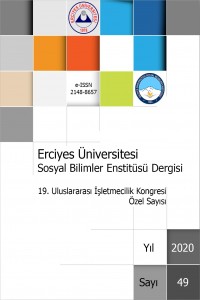The moderating role of psychological capital on the relation of person-job fit to work engagement: A research on private sector employees
Öz
Anahtar Kelimeler
Psychological Capital Positive Psychology Person-Job Fit Work Engagement
Kaynakça
- Avey, J.B, Luthans, F. & Youssef, C.M., 2010. The additive value of positive psychological capital in predicting work attitudes and behaviors. Journal of Management, 36 (2).
- Bakker, A.B. & Schaufeli, W.B., 2008. Positive organizational behaviour: engaged employees in flourishing organizations. Journal of Organizational Behavior. 29, 147-154.
- Demerouti, E., & Bakker, A.B. (2011). The Job Demands–Resources model: Challenges for future research. SA Journal of Industrial Psychology/SA Tydskrif virBedryfsielkunde, 37(2), 974-983.
- Fredrickson, B.L., 2001. The role of positive emotion in positive psychology: the broaden and build theory of positive emotion.
- Leon De Beer, L., Rothmann, S. & Mostert, K., 2016. The bidirectional relationship between person-job fit and work engagement: a three-wave study. Journal of Personnel Psychology. 15 (1).
- Luthans, F., 2002a. Positive organizational behavior: Developing and managing psychological strengths. Academy of Management Executive. 16 (1), 57-72.
- Luthans, F., 2002b. The need for and meaning of positive organizational behavior. Journal of Organizational Behavior. 23 (6), 695–706.
- Luthans, F. & Avolio, B.J., 2009. The point of positive organizational behaviour. Journal of Organizational Behavior. 30, 291-307.
- Luthans, F., Avolio, B.J., Avey, J.B. & Norman, S. M., 2007. Positive psychological capital: measurement and relationship with performance and satisfaction. Personnel Psychology. 60 (3), 541-572.
- Luthans, F., Avey, J.B., Avolio, B.J., Norman, S.M. & Combs, G.J., 2006. Psychological capital development: toward a micro-intervention. Journal of Organizational Behavior. 27 (3).
- Luthans, F., Avey, J.B., Avolio, B.J. & Peterson, S.J., 2010. The development and resulting performance impact of positive psychological capital. Human Resource Development Quarterly. 21 (1).
- Luthans, F., Luthans, K. & Luthans, B., 2004. Positive psychological capital: going beyond human and social capital. Business Horizons. 47 (1), 45–50.
- Luthans, F., Youssef, C.M. & Avolio, B.J., 2007. Psychological capital: developing the human competitive edge. New York: Oxford University Press.
- Luthans, F., & Youssef, C. M. (2004). Human, social, and now positive psychological capital management. Organizational Dynamics, 33, 143–160.
- Schaufeli, W. B. & Bakker, A. B. (2004). Job demands, job resources, and their relationship with burnout and engagement. Journal of Organizational Behavior, 25, 293–315.
- Seligman, M., 2002. Positive Psychology, Positive Prevention, and Positive Therapy. Handbook of Positive Psychology. New York: Oxford University Press, pp. 3-9.
- Youssef, C. & Luthans, F., 2007. Positive organizational behavior in the workplace: the impact of hope, optimism, and resilience. Journal of Management. 33 (5), 774-780.
Kişi-iş uyumunun işe adanmışlık üzerindeki etkisinde psikolojik sermayenin düzenleyici rolü: özel sektör çalışanları üzerinde bir araştırma
Öz
Anahtar Kelimeler
Psikolojik Sermaye Pozitif Psikoloji Kişi-İş Uyumu İşe Adanmışlık
Kaynakça
- Avey, J.B, Luthans, F. & Youssef, C.M., 2010. The additive value of positive psychological capital in predicting work attitudes and behaviors. Journal of Management, 36 (2).
- Bakker, A.B. & Schaufeli, W.B., 2008. Positive organizational behaviour: engaged employees in flourishing organizations. Journal of Organizational Behavior. 29, 147-154.
- Demerouti, E., & Bakker, A.B. (2011). The Job Demands–Resources model: Challenges for future research. SA Journal of Industrial Psychology/SA Tydskrif virBedryfsielkunde, 37(2), 974-983.
- Fredrickson, B.L., 2001. The role of positive emotion in positive psychology: the broaden and build theory of positive emotion.
- Leon De Beer, L., Rothmann, S. & Mostert, K., 2016. The bidirectional relationship between person-job fit and work engagement: a three-wave study. Journal of Personnel Psychology. 15 (1).
- Luthans, F., 2002a. Positive organizational behavior: Developing and managing psychological strengths. Academy of Management Executive. 16 (1), 57-72.
- Luthans, F., 2002b. The need for and meaning of positive organizational behavior. Journal of Organizational Behavior. 23 (6), 695–706.
- Luthans, F. & Avolio, B.J., 2009. The point of positive organizational behaviour. Journal of Organizational Behavior. 30, 291-307.
- Luthans, F., Avolio, B.J., Avey, J.B. & Norman, S. M., 2007. Positive psychological capital: measurement and relationship with performance and satisfaction. Personnel Psychology. 60 (3), 541-572.
- Luthans, F., Avey, J.B., Avolio, B.J., Norman, S.M. & Combs, G.J., 2006. Psychological capital development: toward a micro-intervention. Journal of Organizational Behavior. 27 (3).
- Luthans, F., Avey, J.B., Avolio, B.J. & Peterson, S.J., 2010. The development and resulting performance impact of positive psychological capital. Human Resource Development Quarterly. 21 (1).
- Luthans, F., Luthans, K. & Luthans, B., 2004. Positive psychological capital: going beyond human and social capital. Business Horizons. 47 (1), 45–50.
- Luthans, F., Youssef, C.M. & Avolio, B.J., 2007. Psychological capital: developing the human competitive edge. New York: Oxford University Press.
- Luthans, F., & Youssef, C. M. (2004). Human, social, and now positive psychological capital management. Organizational Dynamics, 33, 143–160.
- Schaufeli, W. B. & Bakker, A. B. (2004). Job demands, job resources, and their relationship with burnout and engagement. Journal of Organizational Behavior, 25, 293–315.
- Seligman, M., 2002. Positive Psychology, Positive Prevention, and Positive Therapy. Handbook of Positive Psychology. New York: Oxford University Press, pp. 3-9.
- Youssef, C. & Luthans, F., 2007. Positive organizational behavior in the workplace: the impact of hope, optimism, and resilience. Journal of Management. 33 (5), 774-780.
Ayrıntılar
| Birincil Dil | İngilizce |
|---|---|
| Konular | İşletme |
| Bölüm | Makaleler / Articles |
| Yazarlar | |
| Yayımlanma Tarihi | 16 Aralık 2020 |
| Gönderilme Tarihi | 26 Ekim 2020 |
| Kabul Tarihi | 2 Aralık 2020 |
| Yayımlandığı Sayı | Yıl 2020 Sayı: 49 |
ERCİYES AKADEMİ | 2021 | sbedergi@erciyes.edu.tr Bu eser Creative Commons Atıf-Gayri Ticari-Türetilemez 4.0 Uluslararası Lisansı ile lisanslanmıştır.


